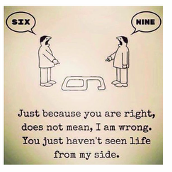In communication, integral theory helps us recognize in ourselves and others how we see the world. It is the individual perspective, like a box or a room of our own perceptions and through its window we see the world, influenced by our thinking and experiences.
These very personal perspectives formulate our thoughts and create our belief system, our value system, and determine our decisions and positions which we, of course, communicate. All of these perspectives, insights and knowledge are understandable and useful, but it is worth understanding how we get from thought to communication.

The image shows a familiar interpersonal challenge. What could be the solution here?
The process starts with self-awareness – How do I see the world? Where do I communicate from?
Whatever community we are in, whether in a relationship, a family, or a workplace, we need an interest in the OTHER'S opinion. In ALL conflict management, THIS is the negotiation skill that allows for the resolution of contradictions. So, a good leader, in order to inspire and guide individuals and teams to achieve common goals, needs to participate constructively in dialogue. This can have the strong impact of initiating lasting change.
Getting to know the OTHER'S opinion starts with questions. You could also say that coaching is the art of asking questions and this is a separate chapter in our training. The coach, the leader, the family member can better and more deeply understand the story presented by the other by asking questions. The one hand they can connect to the situation more effectively, and on the other hand they can provide flexible and intuitive support in order to achieve the set goal by listening to the answers.
Honestly, it is NOT an easy task to stay on the questions during a conversation, because we so much want to TELL OUR truth about the OTHER'S life with a seemingly certain insight. Of course, this would be external information, and not an insight born from the individual - through the questions asked.
The questions, on an artistic level, contain empathy and flexibility. These are the most important elements of coaching! Its language requires nuance, a positive tone and a conscious communication!
If you think about it, you too can feel the difference between a question that calls for accountability and provokes opposition and a research-exploratory reflective question. The first one is like this: Why have you been doing this for years? How did you get to this point? We would all immediately feel a sense of defiance or shame after such questions. How about this one: How long have you wanted to change? What is the biggest challenge for you in taking the first step?
An important role in our training is to recognize what one's own and the other's motivation is in the conversation, that is, to recognize what kind of inner personality drives this motivation.
Another important aspect is that the participants, including ourselves, remember that we want to solve the problem by consensus, so the opinion of each group member must be considered and taken seriously.
The words we use when communicating with each other or with ourselves carry vibrations and affect our body, soul and emotions. The conscious use of our inner monologue or self-talk rearranges the relationships between nerve cells. THIS IS NEUROPLASTICITY – it can reorganize the structure and functions of the nervous system and change them positively.
Personally, for us, communication has been a very interesting area even before our school was founded. What intrigued us the most was HOW EASILY hurtful, destructive, gunpowder communication COMES, whether towards ourselves or towards others.
Since in every tradition the Sound came first in creation, uplifting and changing our communication means reclaiming a God-given knowledge and connection built into us.
The Voice is a creative force. We can strengthen this force within ourselves.